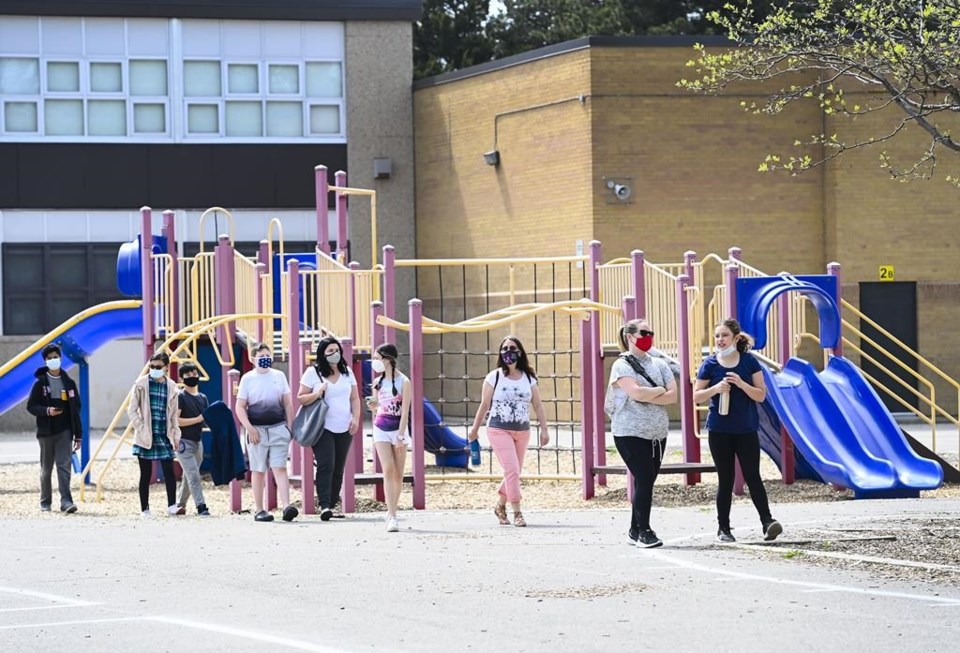TORONTO — School boards plan to pay early attention to individual needs when students return to Ontario classrooms after a year of pandemic-disrupted studies, saying the effort will help address the phenomenon known as "learning loss."
Several boards said they'll be assessing students when school resumes next week to get a sense of how much the children have retained since the last academic year, and where they most need support.
"Our starting point will be to help students adjust back to in-person learning, ensure they feel safe, and that their mental wellness is in a good place," said Warren Hoshizaki, education director for the District School Board of Niagara.
"From there, our educators and support staff will get to know their students as individuals and as learners to best understand their strengths and needs, supporting and empowering them to reach their potential."
Similarly, the Dufferin-Peel Catholic District School Board said working with students at an individual level on core academics strengths "will be the focus for all students this year."
The Waterloo Region District School Board said early literacy will be a focus, meeting students "at their point of need with targeted instruction."
For students in Grades 4 and up, the board said it's planning assessments to understand where students are at in order to help "close any gaps and account for any learning loss, before they begin any new learning."
It also said it plans to do away with the final exam period for the upcoming academic year and is reviewing evaluation methods for high school students in light of the pandemic.
Psychologist Todd Cunningham, who specializes in academic interventions for students with learning disabilities, said it's likely that students will be returning to school with a wide range of academic needs that schools should be prepared to meet.
Students have had unequal access to online learning during the pandemic and some have struggled more than others, leaving them disconnected from school for over a year and a half and threatening some core skills like reading and mathematics, he said.
"What we can expect is a much larger spread of students' academic skills when we return," Cunningham, who is also a professor at the University of Toronto, said in an interview. "Teachers are going to have to be really able to think about this."
Learning loss may not be a problem for a majority of students, he said, but for those it affects, the loss of academic skills can compound over time if not addressed.
Cunningham recommended educators assess students' core skills early in the year to determine who will need more attention, and in what area.
He also said educators should take care to help students feel comfortable at school again before prioritizing coursework.
"Teachers are going to need to not rush too fast into just piling in on all the academics," he said. "Spend several weeks helping to recondition students to the school environment so that then they can feel safe, feel supported and then we really can get into the building up of these critical skills once we've identified those students who need that."
Toronto parent Joy Henderson said she doesn't agree with framing recent learning challenges as a "loss," since kids have dealt with a range of pandemic stresses, including shifts between online and in-class learning, without their usual social and extracurricular supports.
She said she wouldn't be surprised if her three kids – in Grades 6, 9 and 11 – didn't retain everything learned in class over the last year.
"I don't consider it a learning loss at all, but just the natural reaction to a really messed up situation and the poor handling of this pandemic," she said by phone.
"I tell them that I'm proud of them for pivoting so well, with going online and offline and such, but I'm not expecting brilliance during this."
The provincial government said its research into COVID-19's impact on students shows the need for a focus on early literacy and math as students return to class, as well as a need for mental health supports.
It said the research indicated Indigenous and Black students, those from low-income households, and students with disabilities and special education needs have been disproportionately affected by the pandemic.
A spokeswoman for Education Minister Stephen Lecce pointed to $85 million in previously announced government funding earmarked for learning loss, $80 million for mental health supports, and summer learning programs that ran this summer.
"Our priority remains getting students ready for a year of learning," Caitlin Clark said in an email.
Classes were disrupted multiple times over the last academic year as Ontario moved learning online to contend with surges in COVID-19 infections.
The province's back-to-school plan for this year has warned boards to be prepared for a potential closure, but Ontario's chief medical officer of health said he doesn't believe that will happen.
This report by The Canadian Press was first published Aug. 31, 2021.
Holly McKenzie-Sutter and Nicole Thompson, The Canadian Press



